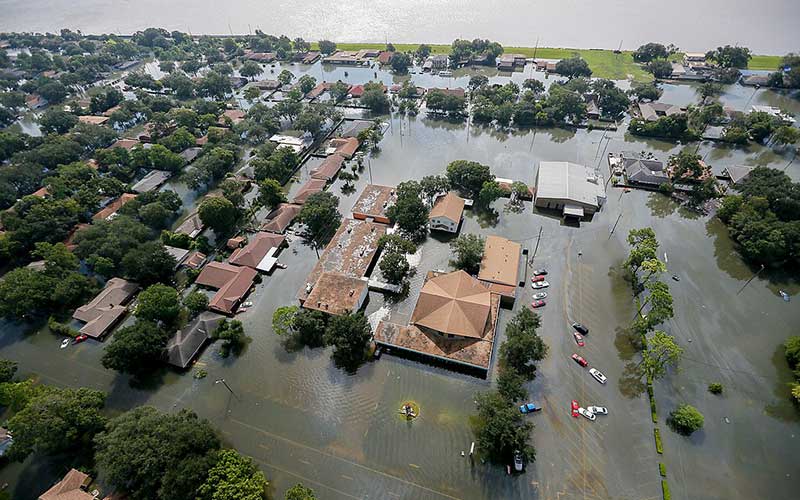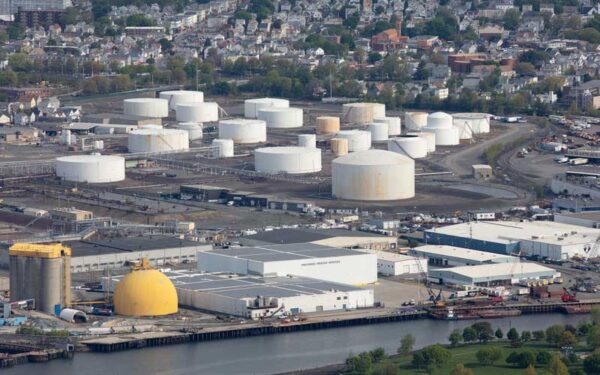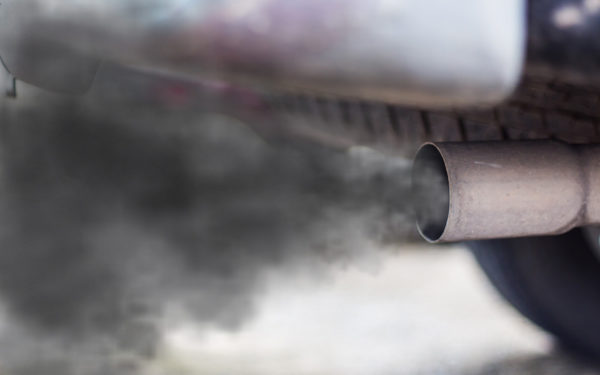
Hurricane Harvey caused thousands of gallons of oil to spill and more than 100 chemical leaks. We can't allow oil companies in New England to leave their infrastructure vulnerable to predicted climate change impacts. Photo: South Carolina National Guard via Wikimedia
Approximately $400 billion. That’s the price tag for the bare-minimum defenses needed to protect coastal communities from short-term sea level rise, according to a new report by the Center for Climate Integrity.
Many New England communities are among those most at risk. And we’re not just threatened by significant sea level rise. Extreme weather caused by climate change may damage coastal infrastructure by, for example, degrading equipment containing hazardous chemicals or by flooding storage facilities. Such damage could result in chemical spills that would endanger New Englanders even more.
Our riskiest infrastructure could and should be reinforced and fortified against these expected climate impacts. But fossil fuel companies like ExxonMobil and Shell would rather take their chances and do nothing to ready their facilities. CLF knows, however, that these companies have a legal duty (not to mention an ethical one) to adapt their facilities to the foreseeable effects of climate change. That is why we’re fighting in court to ensure that they follow the law and do the right thing.
The Cost of Coastal Climate Adaptation
The report by the Center for Climate Integrity focuses on sea level rise we are likely to see within the next 20 years. With this focus, it provides insight into the costs our communities will have to pay in the near-term to protect people and infrastructure from the fallout from our rising seas.
The report also identifies the states, counties, and communities that will bear a lopsidedly large share of the costs of dealing with our rising seas. New England is among those areas expected to be impacted most severely. The cost to protect our coastal infrastructure from even conservative estimates of sea level rise will be huge.
At the macro level, basic seawall protections are projected to cost Massachusetts well over $18 billion. At a more granular level, the cost of building the necessary seawalls just to protect Cape Cod’s Barnstable County totals more than $7 billion.
Other areas face similarly steep costs. Protecting Seconsett Island, Massachusetts, for example, is predicted to cost approximately $900,000 per person. Some communities will be forced to make difficult choices, including managed retreat – meaning they may choose to move inland instead of defending against flooding. Moreover, while the costs of building sea walls are enormous, they represent a sliver of the total expense of adapting to climate impacts. But the cost of doing nothing is even higher.
Fighting Back and Ensuring Costs Are Shared Fairly
Our global addiction to fossil fuels drove us to this dire point. Despite knowing for decades that their product was literally fueling a climate crisis, Big Oil deliberately obscured the science and sowed the doubt that has paralyzed our nation’s response.
Now, it thinks taxpayers and local communities should bear the enormous costs of the climate emergency it created instead of taking proactive action itself. They’ve done it before. As a result of Hurricane Harvey, ill-prepared fossil fuel facilities and chemical plants sustained damage that led to 22,000 barrels of oil and hazardous chemicals spilling into the streets of nearby neighborhoods. Local reporting indicates that Hurricane Harvey caused as many as 100 toxic chemical spills, polluting air and water in the area and imposing still-unknown health risks on residents.
CLF is fighting back. We are not going to let a Hurricane Harvey-like disaster happen here. Companies, including fossil fuel companies, have an obligation to protect their facilities – and, by extension, our communities – from climate change impacts. In particular, fossil fuel and chemical companies must, in accordance with federal environmental laws, consider the effects of climate change on their operations.
Extreme weather is already becoming more frequent and intense in the era of climate change – and this trend will continue. Companies have a responsibility as good corporate citizens to mitigate the damage from chemical spills and the like caused by extreme weather. They also have a legal duty to prevent such spills from happening in the first place.
CLF is fighting to hold fossil fuel and chemical companies accountable to this legal duty here in New England – including in our case against ExxonMobil.
ExxonMobil Must Consider the Effects of Climate Change in Maintaining Its Facilities
ExxonMobil operates the Everett Terminal in Everett, Massachusetts, for which the company is required to hold a permit under the federal Clean Water Act. As a result of this permit, ExxonMobil has a duty, in line with good engineering practices, to proactively consider the impact of climate change-driven extreme weather on the terminal. That includes considering the likelihood that hazardous chemicals will spill into Everett and neighboring Chelsea as a result of a hurricane or other extreme weather –and updating its facility to ensure this does not happen.
Instead of proactively updating its facility to protect against these risks, Exxon would apparently rather risk a toxic chemical spill and let those communities deal with the consequences. But CLF knows that the body of good engineering practices incorporated into Exxon’s Clean Water Act permit dictate that the company must consider the impacts of these foreseeable weather events.
That is why CLF brought a case against Exxon, arguing that the oil giant has violated the terms of its permit by not adapting its oil terminal to predicted climate change impacts. This past March, Exxon tried to get the District Court of Massachusetts to dismiss our case. But CLF successfully warded off the attack, and the court ruled in our favor. The case against Exxon continues.
Our fight to hold ExxonMobil accountable is only the beginning. CLF is working every day to ensure fossil fuel companies cannot shirk their responsibilities and leave New England communities to bear the costs of the climate crisis alone.



